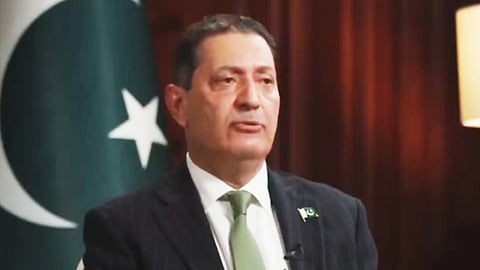

Amid escalating tensions following last month's deadly terror attack in Pahalgam, Pakistan’s Ambassador to Russia has issued a provocative threat against India, claiming Islamabad would respond with the “full spectrum of power” — including nuclear weapons — if New Delhi initiates military action.
In an interview with Russian media outlet RT, Ambassador Muhammad Khalid Jamali alleged that "leaked documents" suggested India was planning strikes on specific Pakistani targets and warned that conflict was “imminent”.
His remarks come even as India continues to diplomatically highlight Pakistan’s complicity in cross-border terrorism and seeks global support to hold Islamabad accountable for harbouring terror outfits.
"The frenzy media of India and the irresponsible statements coming out from that side has compelled us. There are some other leaked documents whereby it has been decided to strike some areas of Pakistan. So, that makes us to feel that this is going to happen and it's imminent," he said.
"When it comes to India and Pakistan, we don't want to get involved into this debate of numerical strength. We will use the full spectrum of power - both conventional and nuclear," he said.
Jamali asserted that Pakistan’s armed forces, with the backing of its people, would retaliate using the “full spectrum of power.”
Pakistan has been on edge over a possible Indian response ever since Pakistan-backed terrorists targeted tourists in the Baisaran valley of Jammu and Kashmir's Pahalgam on April 22.
The warning comes on the heels of Pakistan’s Defence Minister Khawaja Asif’s provocative statement during a Geo News interview on Friday, where he threatened to strike any infrastructure India builds on the Indus River in violation of the treaty. “Certainly, if they attempt to build any kind of structure, we will strike it,” Asif said, adding that “aggression is not just about firing cannons or bullets — blocking or diverting water is also a form of aggression that could lead to deaths from hunger and thirst.”
Also on Saturday, Pakistan’s military carried out a test launch of its Abdali surface-to-surface missile. Capable of carrying both conventional and nuclear warheads, the missile has a range of 450 kilometres. The army claimed the launch was meant to demonstrate “operational readiness.”
Earlier, Pakistani minister Hanif Abbas had openly made a nuclear threat, boasting that missiles like Ghori, Shaheen, and Ghaznavi — along with 130 nuclear warheads — are "kept only for India."
He warned that if India moves to suspend the Indus Waters Treaty and restrict Pakistan's water supply, it should be ready to face a "full-scale war."
Meanwhile, Pakistan Prime Minister Shehbaz Sharif on Saturday claimed Islamabad showed a "responsible and measured" response to India's actions after the Pahalgam terror attack, while denying any link to the incident that killed 26 people. Speaking to Turkiye’s Ambassador in Islamabad, Sharif alleged India had shared no evidence and rejected Pakistan’s offer of an international probe.
In the aftermath of the April 22 terror attack in Jammu and Kashmir’s Pahalgam—which claimed the lives of at least 26 civilians, including a Nepalese tourist and a local pony guide—India has taken a series of decisive actions after links to Pakistan-based terror outfits were established.
Citing "sustained cross-border terrorism," India suspended the Indus Waters Treaty, the 1960 water-sharing pact with Pakistan, paving the way to potentially divert or restrict the flow of Indus River waters into Pakistan — a move that could disrupt water access for millions.
In addition, India cancelled all visas issued to Pakistani nationals and ordered those residing in the country to leave, including individuals holding medical visas.
Pakistan, in turn, responded with threats to suspend all bilateral agreements with India, including the Simla Agreement. Diplomatic ties between the two nations have since been downgraded, with backchannel dialogue cut off amid rising hostilities.
India has also issued an official NOTAM (Notice to Airmen) barring access to its airspace for all aircraft linked to Pakistan.
The Indian government also completely banned all imports and transit of goods coming directly or indirectly from Pakistan. This includes all types of goods, whether they are usually allowed for import or not.
The restriction applies to Pakistani-registered, operated, or leased aircraft, including both commercial and military flights. The ban will be in place till the early morning of May 24, as per the current NOTAM.